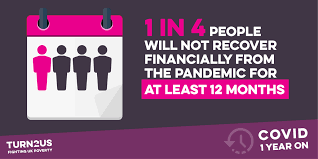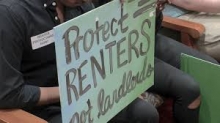Work TV
Watch our TV Channel dedicated to the ‘World of Work’. Explore our video library for informative videos featuring career opportunities at leading companies, franchising opportunities, further education and recruitment professions and their services.
Simon Collyer
More than 7.1 Million People Are Missing Out On £15.1bn of Benefits Says Charity Turn2Us
BENEFITS UNCLAIMED - A large number od benefits are going unclaimed highlights charity Turn2Us.
- More than 7.1 million people are missing out on £15.1bn of benefits
- 45% of people have never checked what benefits they are eligible for
- Use the Turn2us Benefits Calculator here: https://benefits-calculator-2.turn2us.org.uk/
National poverty charity Turn2us warns that at least seven million people across the UK are missing out on over £15 billion of unclaimed benefits, increasing their risk of being pushed into financial hardship or even poverty.
Further research by the charity has found that almost half of people (45%) have never checked their entitlement, with institutional stigma, cultural shame and negative media representation of benefit claimants cited as some of the most common barriers.
Proportionately, pensioners are the least likely to check what benefits they can claim – 63% of whom have never checked. They are also the least likely to claim the benefits they have a right to, with one in three missing out on Pension Credit.
Turn2us has responded to this issue with the release of a new Benefits Calculator tool that has been designed in partnership with people who have lived expertise. The charity is urging people to check their entitlement and start the application process as soon as possible.
Sonya Ruparel, Director of Programmes and Partnerships at Turn2us, said:
“There is an endemic issue of unclaimed benefits in the UK. The confusing, sometimes hostile, and often stigmatising world of social security has led to millions of people not claiming their entitlements. Our new tool sets out to simplify, de-mystify and compassionately support people to access the money they are due.
“Everyone who goes on to claim the benefits our calculator tells them they are entitled to receives an average of £5,320 a year. It is so important for people to check. We urge everyone to do a benefit calculation every six months as part of a regular financial health check.”
(Table 1: Unclaimed benefits)
|
Benefit |
Amount unclaimed |
People missing out |
|
Pension Credit |
£1.8bn |
958,000 |
|
Housing Benefit |
£3.3bn |
745,000 |
|
Income Support / ESA |
£971m |
287,000 |
|
Child Tax Credit |
£1.4bn |
399,000 |
|
Working Tax Credit |
£576m |
211,000 |
|
JSA |
£496m |
126,000 |
|
Child Benefit |
£775m |
503,000 |
|
Universal Credit |
£2.9bn |
1,000,000 |
|
Council Tax Support |
£2.6bn |
2,770,000 |
The new Turn2us Benefits Calculator is the most accurate and efficient tool for people who are trying to work out what means-tested benefits they are entitled to. It is totally independent and run by the charity for no profit.
It only takes 10 minutes to find out what benefits you are entitled to and helps you start the application in a simple and comprehensive way. The new Benefits Calculator is user friendly for people of all digital abilities and the Turn2us helpline can do calculations for people without internet access.
The tool also clarifies the implications of choosing between staying on legacy benefits versus moving to Universal Credit and whether individuals are eligible for a move.
(Table 2: When, if ever, was the last time you checked what benefits you were entitled to?)
|
Age |
% never checked |
|
18-24 |
34% |
|
25-34 |
26% |
|
35-44 |
35% |
|
45-54 |
52% |
|
55+ |
60% |

ABC Comment, have your say below:

The Second May Bank Holiday Benefit Payment Dates
BANK HOLIDAY - If you claim Universal Credit, tax credits or child benefit, and your normal payment date would be Monday, May 31, you can expect to be paid this Friday, May 28.
Universal Credit is paid on the same day each month. Tax credits are typically paid every four weeks or weekly, while child benefit is usually every four weeks on a Monday or Tuesday.
Other benefits like PIP and ESA are expected to follow the same pattern if your payment date is on the bank holiday, so it is likely you will be paid early.
If you are due to be paid early, you won’t need to inform the Department for Work and Pensions (DWP) as the money will come through automatically.
What if I don't get paid?
If you don't get your benefit payment when you expected to, first check double-check the date on your award notice and your bank account.
If you've got the right date, and the money isn't there, you should contact the relevant helpline.
Do keep in mind these are unlikely to be open on bank holidays.
Universal Credit:
Call for free: 0800 328 9344
Welsh speaking: 0800 012 1888
Textphone: 0800 328 1344
Child benefit:
Call for free: 0300 200 3100
Outside UK: +44 161 210 3086
Tax credits:
Call HMRC for free: 0345 300 3900
From outside the UK: +44 2890 538 192
Other benefits:
138266811001
Call for free: 0800 328 9344
Welsh speaking: 0800 328 1744
Textphone: 0800 169 0314
ABC Comment, have your say below:

Citizens Advice Now Helping One Renter Every Minute as Eviction Ban Just “Papering Over the Cracks”
RENTING ISSUES - New research by Citizens Advice shows the charity is now helping one person every minute with problems relating to renting from a private landlord.
In the first two months of this year, the charity saw a 40% increase in people seeking one-to-one advice on issues relating to the private rented sector compared to the same period in 2020.
A year ago today the government announced a ban on most eviction proceedings. That ban was extended several times and is in place until May 31. However, its conditions have been altered so tenants with more than six months rent outstanding can now be served with an eviction notice. This includes people who have built up arrears during the pandemic.
Polling by Citizens Advice, through its national Tenants’ Voice panel, shows private renters are still concerned by the threat of eviction despite the ban. A third said they had been worried about the issue in the last three months.
Figures from the charity's website show In the first two months of the year 69,000 people viewed its advice pages dealing with problems related to private tenancies.
Citizens Advice also helped 16,530 people with one-to-one advice on these issues in the same two-month period. That’s one every minute during office hours. This includes:
- 4,781 (29%) who had problems with repairs or maintenance
- 1,541 (9%) who were worried about possession action not related to rent arrears
- 848 (5%) who reported harassment by their landlord
- 670 (4%) who wanted help with a possible illegal eviction.
The Tenants’ Voice panel also found two thirds of those surveyed had experienced problems with maintenance or disrepair in the last three months.
Case study:
Sophia, a teaching assistant, is the single parent of a toddler. She also cares for her disabled father who lives with her and her daughter.
She came to Citizens Advice for help when she was issued with a Section 21 eviction notice by her landlord after complaining about maintenance problems, including extended periods without heating or hot water.
She has paid hundreds of pounds out of her own money for repairs. This has left her struggling to afford the rent and her landlord has said he’s charging her 8.1% interest a day for late rent.
Sophia said: “I have had to wash up in the bath, wash my daughter’s clothes in the bath. She has woken up cold in the night, it’s been a nightmare. Previously we always paid our rent 100% - even throughout the pandemic.
“I’m a wreck. I can't sleep. I am up every night at 3am in the morning and throwing up worrying about it. I have until the end of May to find somewhere to live.”
Opportunity for change:
Citizens Advice says the forthcoming Renters’ Reform Bill is an opportunity to lay the foundations of a more equitable private rented sector. The charity wants:
- An end to Section 21 ‘no fault’ evictions - as promised by the government in 2019
- Indefinite tenancies used as standard, to give renters more certainty and flexibility, and reduce their exposure to annual rent increases.
- A new National Housing Body and register to set consistent standards, give tenants greater protection, and help responsible landlords
Alistair Cromwell, Acting Chief Executive of Citizens Advice, said:
“The government’s eviction ban helped private tenants feel more secure during the pandemic. But it’s been a case of papering over the cracks.
“Our research paints a disturbing picture of a private rental market in which tenants pay high rents on badly maintained properties, while living in constant fear that any complaint could result in summary eviction.
“The Renters’ Reform Bill is an opportunity to lay better foundations for a more equitable private rental market which provides better quality housing and helps tenants feel more settled in their homes.”
Background:
US Mental Health Action Day Held May 20th
MENTAL Health - Thursday, May 20, 2021 In the wake of COVID-19, millions of people have uncovered new mental health conditions and millions more have had their existing challenges exacerbated.
This was the first US mental health action day.
ABC Comment, have your say below:

London Landlords See Falling Demand
TENANTS LEAVE LONDON - Private sector tenants are leaving London in response to the COVID-19 pandemic. According to new research by the National Residental Landlords Association, landlords renting properties in London were the only ones in the country to report that tenant demand had fallen.
The survey of NRLA members was conducted by the research consultancy BVA-BDRC.
ABC Comment, have your say below:

Resources for Starting a Business After Leaving the Force
VETERANS SEEKING HELP - More than 14,000 men and women exit the armed forces in the UK each year. Most look for employment as they reenter civilian life, and about 6 per cent begin their entrepreneurial journey.
Fortunately, there are resources available to ex-military personnel who are aiming to start their own businesses. As long as you have a promising business idea and a knack for leadership, you can lay the groundwork for a successful venture by tapping into the resources available. Below, ABC has provided some practical advice and information for UK veteran entrepreneurs.
Hiring Freelancers
First, it’s critical to understand from the beginning that you shouldn’t try to do everything on your own. Even with help from resources, you will do well to consider what types of professionals can help you build a strong business. Putting together a team of qualified freelancers can make your operations more efficient, reduce your stress, and help you avoid burnout.
For example, hiring a freelance virtual assistant will relieve you of the burden of menial everyday tasks like sending invoices and fielding phone calls. And a web SEO expert, web designer, and/or content developer can help you create an engaging, user-friendly website that boosts your online presence. Go through an online job platform, and you can compare delivery times, rates, and reviews when choosing between candidates.
Veteran Business Resources
Now, let's briefly discuss some of the top organizations that provide resources for veteran entrepreneurs in the UK.
SME Loans
Veterans can receive loans for £1,000 to £500,000 from SME Loans for a specialist startup or small business. To qualify, your business must have been trading for six months or longer and maintain a monthly turnover of £5,000.
PDQ Funding
This lender requires the same conditions as SME Loans. In addition, your business must be registered in the UK as a sole trader or limited company. The advantage of PDQ Funding is that it offers business loans to veterans with bad credit, as well as merchant cash advances.
X-Forces Enterprise
X-Forces Enterprise provides different resources to veterans. Through Startup Loans, X-Forces offers unsecured personal loans at an average rate of £11,000, though you can be approved for up to £25,000. These loans come with fixed-rate interest for up to five years. This organization also provides veterans with free courses and workshops aimed at helping veterans determine whether self-employment is right for them, as well as what to expect as an entrepreneur.
RFEA
In conjunction with the Royal British Legion, RFEA offers employment grants designed to help veterans acquire the skills necessary for starting and running a business. The licenses grant is available for up to £250 to help ex-military members earn a license specific to their sector. The training, travel, accommodation, and equipment grant rewards up to £1,000 to veterans who are pursuing a training course.
Help for Heroes
Help for Heroes has partnered with X-Forces to provide the free Business Experience Course for wounded ex-military personnel. The course is six days long and is geared toward helping veterans decide whether or not to become an entrepreneur, and it also teaches essential business skills in budgeting, marketing, and more.
If you’re a veteran thinking about starting a UK business, you have plenty of resources you can tap into. Along with researching the organizations above, keep digging to see what other resources could help you prepare and get the strong launch you need. And remember to strategize what types of freelancers you could bring on board early in the process. You’re well-equipped to run a thriving business; now, get out there and make it happen!
Article supplied by Deploycare.
ABC Comment, have your say below:

Mental Health Awareness Week: Ben tells his story
MENTAL HEALTH - An Essex County Fire and Rescue Service firefighter is sharing mental health advice during Mental Health Awareness Week to encourage people to reach out for support when they need it.
We can all struggle with mental health issues, no matter who you are. As a Service, Essex County Fire and Rescue Service has support available for colleagues and encourages employees to seek support when they need it including its Trauma Risk Management (TRiM) co-ordinators, making sure firefighters who have been involved in a traumatic incident get support.
Watch Manager Ben Turner is a Traumatic Risk Management (TRiM) volunteer at Essex County Fire and Rescue Service, helping colleagues to get support after distressing experiences.
But Ben, who is based at Clacton Fire Station, has sought help himself recently following a difficult past 12 months.
He has shared his story as part of Mental Health Awareness Week (10-16 May) to encourage people to talk about mental wellbeing, ask for support and keep an eye on their colleagues and loved ones.
Ben says people should care for their mental wellbeing in the same way they look after their physical health.
He said: “If you cut your arm you don’t think twice about asking for a first aider. With mental health, you can feel awful about the situation you perceive yourself to be in but carry on regardless.
“When I first speak to colleagues they say: ‘I’m all good’. But everybody has a ‘bucket’ where they put their worries and if you are not doing things to empty the bucket it spills over. It’s easy to mask the fact you are not okay.
“Mental fitness is no different to physical fitness. The better your mental fitness is, the more easily you will cope with what life throws at you.”
Ben admits the last 12 months have been particularly difficult, particularly dealing with the loss of his close friend Aston Everett.
Aston, 54, a former colleague of Ben’s on Clacton’s Green Watch, died on 5 January after collapsing while on duty at the Service’s Urban Search and Rescue Station in Lexden.
Ben said: “I was offered a counsellor and I took it up. If it had been one thing, even though it was horrific, I probably would have worked through it but with the accumulation of the things going on in my life, I said: ‘I am struggling to cope, now I need some help.’
“It has made such a massive difference. It has helped me to get back to where I was before and built up my resilience.”
This Mental Health Awareness Week, Ben is encouraging everyone to talk about mental wellbeing.
He said: “Everybody has had moments, weeks, months or longer where they are finding life really challenging – don’t be afraid to talk about it. I don’t know anybody who has made things worse by saying: ‘I need some help here.'
“Be aware changes in people’s tone or behaviour. Ask them how they are feeling. If they say they are OK but don’t sound like they are, just check again.
“Don’t be afraid to ask. They might not want to open up, but the fact you have shown you care goes a long way.”
There is support in Essex for those who need it, head over to www.essex.gov.uk/mental-health/get-help-and-support to find out more.
ABC Comment, have your say below:

ABC Recieves a Response From Eddie Hughes MP, Minister for Rough Sleeping and Housing Regarding Tenant References and Illegal Evictions
MINISTER FOR ROUGH SLEEPING AND HOUSING - Eddie Hughes MP, has kindly responded to our questions about tenant references and illegal evictions put to him by DWP Minister Will Quince. We are certainly hearing complaints about landlords hiring Eastern European thugs to evict tenants though that remains only in a small minority of cases.
A landlord would be taking a huge risk taking the law into their own hands. Unless you fancy residing at Her Majesty’s Pleasure for a period in one of UK’s prisons, we might suggest taking a legal method for dealing with tenants in arrears.
Section 21 (no fault evictions) still remains in force and the powerful landlords lobby have been successful on keeping this legislation on the books so far. This legislation stands out like a sore thumb and Boris will face the music at the next election unless something is done about banishing Section 21 (and not replacing it with something similar).
There are bad landlords, but there are bad tenants too. We must never forget that.
Homes should be for living in, not for speculating with and gambling on. The effects on children living in bed and breakfast accommodation will not be known for years to come.
The Minister gives a straight and honest answer and we appreciate his candid response.
ABC Information, Eddie Hughes MP, is the Parliamentary Under-Secretary of State for Housing and Rough Sleeping. Mr Hughes MP is the Conservative MP for Walsall North, and has been an MP continuously since 8 June 2017. He currently holds the Government post of Parliamentary Under-Secretary (Housing, Communities and Local Government).
ABC Comment, have your say below:

The Ministers response is below:

UK Government - Support for Renters Being Phased Out Gradually
RENTERS - will continue to be supported as national COVID-19 restrictions ease says government.
- Four-month notice periods for most tenants until at least end of September.
- Move will ensure renters are protected as we continue through the Roadmap.
Renters will continue to be supported as national COVID-19 restrictions ease, with longer notice periods in place until at least October, Housing Minister Christopher Pincher announced today (12 May 2021).
Thanks to the success of the vaccine programme and the public efforts to suppress the virus, the nation is now progressing cautiously through the Roadmap, and emergency measures for renters introduced during the pandemic will be brought in line with this.
As part of a phased approach, notice periods – previously extended to 6 months as an emergency measure during the pandemic - will be set at four months from 1 June. This will offer tenants continued protection throughout Step 3 and into Step 4, which will begin from 21 June at the earliest.
Subject to the public health advice and progress with the Roadmap, notice periods will return to pre-pandemic levels from 1 October.
The current ban on bailiff-enforced evictions, introduced as an emergency measure during lockdown, will end on 31 May. Bailiffs have been asked not to carry out an eviction if anyone living in the property has COVID-19 symptoms or is self-isolating.
The measures will ensure renters continue to be protected with longer notice periods for the coming months, while allowing landlords to access justice - 45% of private landlords own just one property and are highly vulnerable to rent arrears.
Extensive financial support remains in place to help people meet their outgoings, including the furlough scheme and the Universal Credit uplift, which have both been extended until the end of September.
Housing Minister, Rt Hon Christopher Pincher MP said:
From the beginning of the pandemic, we have taken unprecedented action to protect renters and help keep them in their homes.
As COVID restrictions are eased in line with the Roadmap out of lockdown, we will ensure tenants continue to be supported with longer notice periods, while also balancing the need for landlords to access justice.
Crucial financial support also remains in place including the furlough scheme and uplift to Universal Credit.
Courts will continue to prioritise the most serious cases, such as those involving fraud or anti-social behaviour, with many of the evictions waiting to be enforced when the ban lifts predating the pandemic.
This week the government announced that a White Paper will be published in the autumn that will set out proposals to create a fairer private rented sector that works for both landlords and tenants.
This includes proposals for the abolition of Section 21 ‘no fault’ evictions to give tenants greater security and a new ‘lifetime deposit’ to ease the burden when moving house.
Further information
From 1 June, notice periods that are currently 6 months will reduce to at least 4 months. Notice periods for the most serious cases that present the most strain on landlords will remain lower:
- anti-social behaviour (immediate to 4 weeks’ notice)
- domestic abuse in the social sector (2 to 4 weeks’ notice)
- false statement (2 to 4 weeks’ notice)
- over 4 months’ accumulated rent arrears (4 weeks’ notice)
- breach of immigration rules ‘Right to Rent’ (2 weeks’ notice)
- death of a tenant (2 months’ notice)
Notice periods for cases where there is four or more months’ of unpaid rent, will reduce to 2 months’ notice from 1 August. This is to support both landlords and tenants and responds to the greater difference between COVID and pre COVID notice periods for rent arrears.
Renters will continue to be supported with living costs, including rent, through the Coronavirus Job Retention Scheme until 30 September 2021.
Local Housing Allowance rates are being maintained at their increased level in cash terms, and the government has also extended the £20 per week uplift in Universal Credit until the end of September.
For those who require additional support, we have made £140 million in Discretionary Housing Payments funding available for local authorities this financial year.
14 days’ notice is required before an eviction can take place. Therefore, no evictions are expected to take place before mid-June except in the most serious circumstances, and bailiffs have been asked not to carry out an eviction if they have been made aware that anyone living in the property has COVID-19 symptoms or is self-isolating.
ABC Comment, have your say below:

Our BBC Look East Appearance with Sports Presenter Tom Williams
BBC LOOK EAST - As part of our Mental Health Awareness Week 2021 initiative, we went sailing with Chelmsford Radio Yacht Club (CRYC) as a backdrop to talk about SAILING WELLNESS and the positive benefits of getting afloat and 'blue health'.
Blackwater Sailing Clubs, Commodore, Dr Nigel Butler, gave the sailors some extra time but the BBC were well on schedual and they created this excellent story with a piece about para-Olympic sailor Hannah Stodel to boot. Even the weather cooperated.
This is the first time we have seem Radio Controlled Model Yacht Racing on the box. The Class are the IOM Class (International One Meter).

Image: Fleet action as a race gets underway.
There was a good turn out as you can imagine.
Special credit must go to the BBC cameraman Jamie for the footage.

Image: A high degree of concentration is needed.
ABC Note: Film shown courtesy of the BBC.

SAILING WELLNESS is an ABC project designed to tackle Mental Health.
ABC Note: Film used courtesy of the BBC.
























